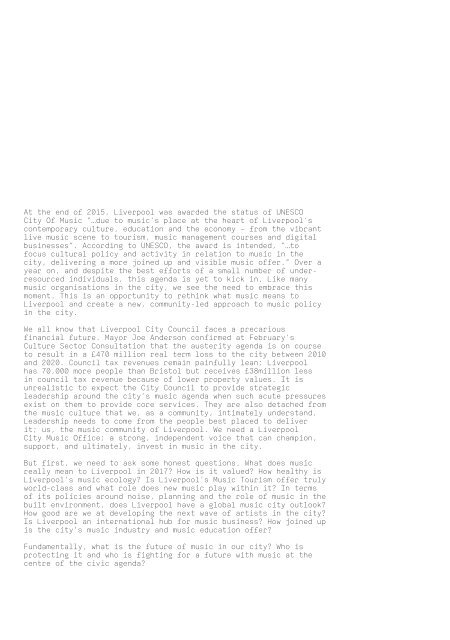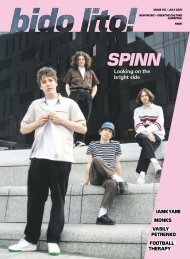Liverpool, Music City? - Report
Is Liverpool a global music city? Challenges, reflections and solutions from the Liverpool music community. A listening project by LJMU, Bido Lito! magazine and the Liverpool music community. May - November 2017
Is Liverpool a global music city?
Challenges, reflections and solutions from the Liverpool music community.
A listening project by LJMU, Bido Lito! magazine and the Liverpool music community.
May - November 2017
You also want an ePaper? Increase the reach of your titles
YUMPU automatically turns print PDFs into web optimized ePapers that Google loves.
At the end of 2015, <strong>Liverpool</strong> was awarded the status of UNESCO<br />
<strong>City</strong> Of <strong>Music</strong> “…due to music’s place at the heart of <strong>Liverpool</strong>’s<br />
contemporary culture, education and the economy – from the vibrant<br />
live music scene to tourism, music management courses and digital<br />
businesses”. According to UNESCO, the award is intended, “…to<br />
focus cultural policy and activity in relation to music in the<br />
city, delivering a more joined up and visible music offer.” Over a<br />
year on, and despite the best efforts of a small number of underresourced<br />
individuals, this agenda is yet to kick in. Like many<br />
music organisations in the city, we see the need to embrace this<br />
moment. This is an opportunity to rethink what music means to<br />
<strong>Liverpool</strong> and create a new, community-led approach to music policy<br />
in the city.<br />
We all know that <strong>Liverpool</strong> <strong>City</strong> Council faces a precarious<br />
financial future. Mayor Joe Anderson confirmed at February’s<br />
Culture Sector Consultation that the austerity agenda is on course<br />
to result in a £470 million real term loss to the city between 2010<br />
and 2020. Council tax revenues remain painfully lean; <strong>Liverpool</strong><br />
has 70,000 more people than Bristol but receives £38million less<br />
in council tax revenue because of lower property values. It is<br />
unrealistic to expect the <strong>City</strong> Council to provide strategic<br />
leadership around the city’s music agenda when such acute pressures<br />
exist on them to provide core services. They are also detached from<br />
the music culture that we, as a community, intimately understand.<br />
Leadership needs to come from the people best placed to deliver<br />
it; us, the music community of <strong>Liverpool</strong>. We need a <strong>Liverpool</strong><br />
<strong>City</strong> <strong>Music</strong> Office; a strong, independent voice that can champion,<br />
support, and ultimately, invest in music in the city.<br />
But first, we need to ask some honest questions. What does music<br />
really mean to <strong>Liverpool</strong> in 2017? How is it valued? How healthy is<br />
<strong>Liverpool</strong>’s music ecology? Is <strong>Liverpool</strong>’s <strong>Music</strong> Tourism offer truly<br />
world-class and what role does new music play within it? In terms<br />
of its policies around noise, planning and the role of music in the<br />
built environment, does <strong>Liverpool</strong> have a global music city outlook?<br />
How good are we at developing the next wave of artists in the city?<br />
Is <strong>Liverpool</strong> an international hub for music business? How joined up<br />
is the city’s music industry and music education offer?<br />
Fundamentally, what is the future of music in our city? Who is<br />
protecting it and who is fighting for a future with music at the<br />
centre of the civic agenda?


















